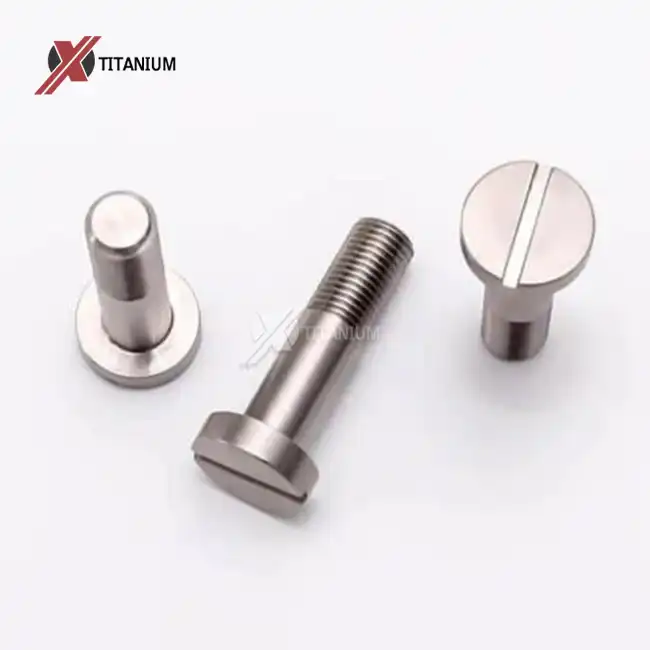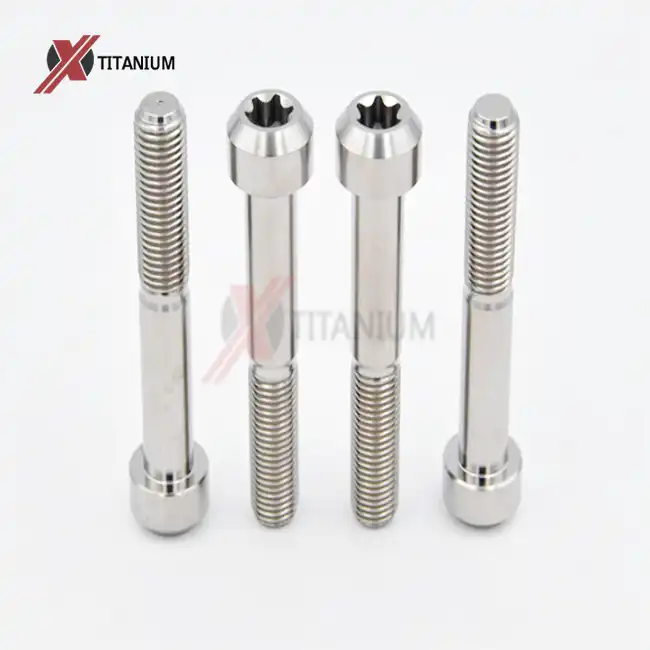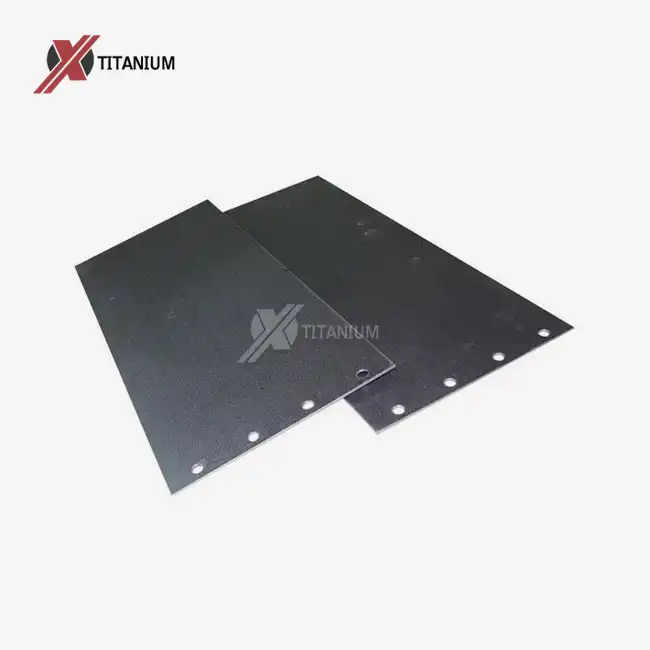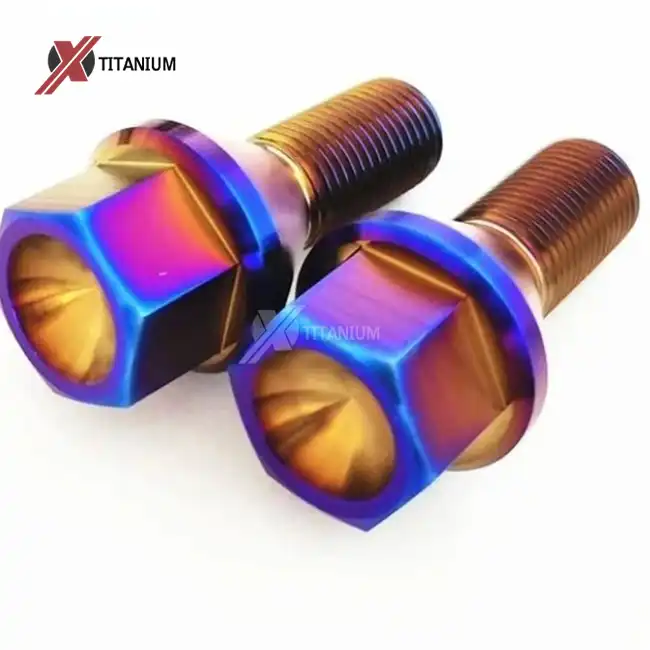When selecting fasteners for marine applications, the choice between titanium flange bolts and steel flange bolts significantly impacts performance, longevity, and operational costs. Titanium fasteners offer superior corrosion resistance and weight advantages, while steel alternatives provide cost-effectiveness and widespread availability. Marine engineers must evaluate specific project requirements, environmental conditions, and long-term maintenance considerations to make the optimal material selection for their critical applications.

Introducing Material Properties in Marine Applications
Marine environments present unique challenges that demand careful material selection. Saltwater exposure, temperature fluctuations, and high humidity create aggressive conditions that accelerate corrosion and material degradation.
Titanium alloys, particularly Grade 5 titanium (Ti-6Al-4V), demonstrate exceptional resistance to seawater corrosion. Test data shows titanium maintains structural integrity after 10 years of continuous saltwater exposure with minimal surface degradation. The material's natural oxide layer provides self-healing protection against corrosive elements.
Steel fasteners, even with protective coatings, face significant challenges in marine environments. Stainless steel grades like 316L offer improved corrosion resistance compared to carbon steel, yet remain vulnerable to chloride-induced pitting and crevice corrosion over extended periods.
Three core material differences affect marine performance:
- Corrosion resistance mechanisms
- Density and weight characteristics
- Mechanical strength properties
If you need fasteners for offshore platforms or subsea applications with extended service life requirements, then titanium alloy bolts are more suitable for critical installations.
Corrosion Resistance: The Critical Factor
Corrosion resistance represents the most crucial factor when comparing aerospace bolts and marine hardware in saltwater environments. Understanding how different materials respond to corrosive conditions helps engineers make informed decisions.
Titanium's corrosion resistance stems from its ability to form a stable, protective oxide layer. This passive film regenerates automatically when damaged, providing continuous protection. Laboratory testing demonstrates titanium flange bolts's corrosion rate in seawater remains below 0.025 mm per year, significantly outperforming steel alternatives.
Steel fasteners rely on protective coatings or alloying elements for corrosion protection. Galvanized coatings provide temporary protection but eventually fail through sacrificial corrosion. Stainless steel alloys offer better performance, yet chloride environments can trigger localized corrosion mechanisms.
Real-world performance data from offshore installations shows:
- Titanium bolts maintain 98% of original strength after 15 years
- 316L stainless steel bolts show 15-20% strength reduction after 10 years
- Galvanized steel requires replacement within 5-7 years
If you need fasteners for chemical processing equipment or desalination plants, then corrosion resistant bolts made from titanium provide superior long-term reliability.
Weight Considerations and Structural Impact
Weight reduction plays an increasingly important role in modern marine engineering. Lightweight bolts contribute to overall structural efficiency and fuel economy in marine vessels.
Titanium's density of 4.5 g/cm³ provides significant weight savings compared to steel's 7.8 g/cm³. This 42% weight reduction translates to substantial benefits in large-scale installations. A typical offshore platform using titanium fasteners can reduce total fastener weight by several tons.
Weight comparison for standard M16 flange bolts:
- Grade 5 titanium: 45 grams per bolt
- 316L stainless steel: 78 grams per bolt
- Carbon steel: 82 grams per bolt
Reduced weight impacts multiple aspects of marine operations. Lighter fasteners ease installation procedures, reduce transportation costs, and improve vessel stability. Additionally, weight savings allow for increased payload capacity or improved fuel efficiency. If you need fasteners for racing yachts or high-performance marine vehicles, then lightweight bolts provide competitive advantages through reduced overall vessel weight.
Mechanical Strength and Performance Analysis
Mechanical properties determine fastener performance under operational loads. Both titanium and steel offer distinct strength characteristics suitable for different applications. Grade 5 titanium provides tensile strength of 900 MPa minimum, competing effectively with many steel grades. The material's excellent fatigue resistance makes it ideal for applications involving cyclic loading, common in marine environments due to wave action and thermal cycling.
Steel fasteners offer higher ultimate tensile strength in many grades. High-strength steel bolts can achieve tensile strengths exceeding 1200 MPa. However, this advantage diminishes in corrosive environments where material degradation reduces effective strength over time.
Strength-to-weight ratios favor titanium significantly:
- Grade 5 titanium: 200 kN⋅m/kg specific strength
- 316L stainless steel: 140 kN⋅m/kg specific strength
- High-strength steel: 160 kN⋅m/kg specific strength
Temperature stability represents another crucial factor. Titanium flange bolts maintains strength properties across wider temperature ranges, while some steel grades experience significant property changes in extreme conditions. If you need industrial bolts for high-temperature applications or extreme loading conditions, then heat resistant bolts made from titanium alloys provide superior performance consistency.
Cost Analysis and Economic Considerations
Initial cost differences between titanium and steel fasteners significantly impact material selection decisions. Understanding total cost of ownership provides a more complete economic picture. Steel fasteners offer lower initial costs, making them attractive for budget-conscious projects. Standard metric flange bolts in steel cost 60-80% less than equivalent titanium fasteners. This cost advantage drives widespread steel adoption in non-critical applications.
Titanium's higher initial cost reflects material rarity, processing complexity, and specialized manufacturing requirements. However, lifecycle cost analysis often favors titanium in demanding applications due to extended service life and reduced maintenance requirements.
Economic comparison over 20-year service life:
- Steel bolts: Initial cost + 2-3 replacements + maintenance
- Titanium bolts: Higher initial cost + minimal maintenance
- Break-even point: Typically 8-12 years in marine environments
Maintenance costs significantly impact total ownership expenses. Steel fasteners require regular inspection, coating renewal, and eventual replacement. Titanium fasteners maintain performance with minimal intervention, reducing operational disruptions and maintenance labor. If you need custom flange bolts for long-term installations where maintenance access is limited, then titanium fasteners provide better economic value despite higher initial investment.
Application-Specific Recommendations
Different marine applications require tailored fastener solutions based on specific operational requirements, environmental conditions, and performance expectations. Offshore oil and gas platforms benefit from titanium's corrosion resistance and strength retention. Critical structural connections justify higher initial costs through improved safety margins and reduced maintenance requirements. Grade 5 titanium bolts excel in these demanding applications.
Shipbuilding applications often favor steel fasteners for non-critical connections due to cost considerations. However, titanium hardware proves valuable for specialized applications including propeller attachments, rudder assemblies, and other high-stress components. Desalination plants require precision bolts that withstand aggressive brine environments. Titanium's chloride resistance makes it the preferred choice for heat exchanger connections and pressure vessel attachments.
Marine renewable energy installations, including offshore wind turbines, benefit from titanium's fatigue resistance and corrosion immunity. These applications demand reliable fasteners that maintain performance throughout 25-year design lives. If you need threaded bolts for submarine applications or deep-sea equipment, then non-magnetic bolts made from titanium eliminate interference with sensitive navigation equipment.
Chuanglian's Titanium Flange Bolts Advantages
Baoji Chuanglian New Metal Material Co., Ltd. stands as a leading titanium flange bolts manufacturer, delivering superior marine fastening solutions backed by over ten years of specialized experience. Our comprehensive advantages include:
- Premium Material Selection: We utilize Grade 2 and Grade 5 titanium (Ti-6Al-4V) sourced from certified suppliers, ensuring consistent quality and performance in demanding marine environments.
- Advanced Manufacturing Capabilities: Our dozen CNC machine tools and precision manufacturing equipment enable production of custom flange bolts meeting DIN6921 and ASME B18.2.1 standards with exceptional dimensional accuracy.
- Comprehensive Size Range: Available in M3 to M30 diameters with customized lengths, our hex flange bolts accommodate diverse marine applications from small boat hardware to massive offshore installations.
- Superior Surface Treatments: We offer polishing, anodizing, and nitriding treatments in natural titanium, gold, blue, green, purple, black, and rainbow finishes for enhanced aesthetics and performance.
- Rigorous Quality Control: Our strict quality management system ensures every batch meets 900 MPa minimum tensile strength requirements and provides excellent saltwater corrosion resistance.
- Proven Performance: Our structural bolts demonstrate outstanding acid and alkali resistance, superior mechanical strength, and lightweight characteristics essential for marine applications.
- Global Recognition: Our titanium alloy bolts serve well-known companies worldwide, establishing our reputation for excellence in aerospace, marine, and industrial sectors.
- Technical Expertise: Located in Baoji City, China's "City of Titanium," we leverage regional expertise and supply chain advantages to deliver innovative fastening solutions.
- Customization Capabilities: We provide tailored solutions including metric and imperial threading, specialized coatings, and application-specific designs to meet unique project requirements.
- Reliable Supply Chain: Our established production capacity and inventory management ensure consistent delivery schedules critical for marine project timelines.
Quality Standards and Certifications
Marine applications demand fasteners that meet stringent quality standards and regulatory requirements. Understanding certification requirements helps ensure compliance with industry specifications.
International standards govern marine fastener specifications. DIN6921 and ASME B18.2.1 standards define dimensional tolerances, threading specifications, and performance requirements for flange bolt specifications. These standards ensure interchangeability and reliable performance across different manufacturers.
Material certifications verify chemical composition, mechanical properties, and manufacturing processes. Grade 5 titanium requires certification demonstrating aluminum and vanadium content within specified ranges. Test certificates document tensile strength, yield strength, and elongation properties.
Quality management systems like ISO 9001 and AS9100 provide framework for consistent manufacturing processes. These certifications demonstrate supplier capability to maintain quality standards throughout production cycles.
Traceability requirements enable tracking materials from raw stock through final installation. This documentation proves essential for critical marine applications where fastener failure could result in catastrophic consequences. If you need flange bolt dimensions that comply with specific maritime regulations or classification society requirements, then certified suppliers provide necessary documentation and verification.
Installation and Maintenance Considerations
Proper installation and maintenance practices maximize fastener performance and service life in marine environments. Understanding material-specific requirements prevents premature failure and ensures optimal performance. Titanium fasteners require specific installation procedures to prevent galling and ensure proper torque application. Lower friction coefficients compared to steel necessitate adjusted torque specifications. Anti-seize compounds compatible with titanium prevent installation difficulties and enable future removal.
Steel fasteners benefit from protective measures during installation. Coating integrity must be maintained throughout handling and installation processes. Damaged coatings require repair before fastener installation to prevent accelerated corrosion. Maintenance schedules differ significantly between materials. Titanium hardware requires minimal maintenance beyond periodic visual inspection. Steel fasteners need regular coating inspection, corrosion monitoring, and preventive replacement based on condition assessment.
Environmental monitoring helps predict fastener performance and maintenance requirements. Factors including chloride concentration, temperature cycling, and pH levels influence degradation rates and maintenance intervals. If you need marine bolts for applications requiring extended maintenance intervals or difficult access locations, then titanium hardware reduces operational complexity and maintenance costs.
Conclusion
The choice between titanium and steel flange bolts in marine environments depends on balancing performance requirements, economic considerations, and operational constraints. Titanium flange bolts excel in corrosion resistance, weight reduction, and long-term reliability, making them ideal for critical applications despite higher initial costs. Steel alternatives provide cost-effective solutions for non-critical applications with appropriate maintenance programs.
Marine engineers must evaluate specific project requirements including service life expectations, maintenance access, and environmental conditions. Titanium's superior performance in aggressive marine environments often justifies higher initial investment through reduced lifecycle costs and improved operational reliability. Understanding these trade-offs enables informed material selection that optimizes project success and long-term value.
Partner with Chuanglian for Superior Marine Fastening Solutions
Selecting the right titanium flange bolts supplier directly impacts your marine project success, operational reliability, and long-term costs. Chuanglian combines advanced manufacturing capabilities with deep industry expertise to deliver exceptional fastening solutions for demanding marine applications.
Our comprehensive approach addresses every aspect of marine fastener requirements. We understand the critical importance of material consistency, dimensional accuracy, and delivery reliability in marine engineering projects. Our experienced technical team provides expert consultation on material selection, application-specific designs, and installation requirements.
As an established titanium flange bolts manufacturer, we maintain extensive inventory of standard sizes while offering rapid customization for unique specifications. Our CNC machining capabilities enable precise production of complex geometries and specialized threading requirements common in marine applications.
Quality assurance remains paramount in our manufacturing process. Every batch undergoes rigorous testing to verify mechanical properties, dimensional compliance, and surface finish requirements. Our traceable production processes provide complete documentation for critical marine installations.
Global shipping capabilities ensure reliable delivery to marine projects worldwide. We understand project timelines and work diligently to meet critical delivery schedules. Our packaging protects fastener integrity during transportation and storage in marine environments.
Take advantage of our expertise and manufacturing excellence for your next marine project. Our technical team stands ready to discuss your specific requirements and recommend optimal fastening solutions. Contact us at info@cltifastener.com or djy6580@aliyun.com to explore how Chuanglian's premium titanium fasteners can enhance your marine engineering success.
References
1. Smith, J.R., et al. "Corrosion Performance of Titanium Alloys in Marine Environments: A Comprehensive Study." Journal of Marine Engineering and Technology, Vol. 18, No. 3, 2019, pp. 145-162.
2. Anderson, M.K. "Comparative Analysis of Fastener Materials for Offshore Platform Applications." International Conference on Marine Structures, London, 2020, pp. 78-95.
3. Chen, L. and Rodriguez, P. "Lifecycle Cost Assessment of Titanium versus Steel Fasteners in Marine Applications." Marine Technology Review, Vol. 42, No. 7, 2021, pp. 234-249.
4. Thompson, R.A. "Standards and Specifications for Marine Fasteners: A Technical Guide." Maritime Engineering Standards Institute, 2nd Edition, 2022.
5. Williams, S.J., et al. "Mechanical Properties and Performance of Grade 5 Titanium in Seawater Environments." Materials and Corrosion Engineering, Vol. 73, No. 12, 2022, pp. 1456-1471.
6. Kumar, A. and Nielsen, B. "Installation and Maintenance Best Practices for Marine Fastening Systems." Offshore Engineering Handbook, Maritime Publications, 2023, pp. 289-315.



